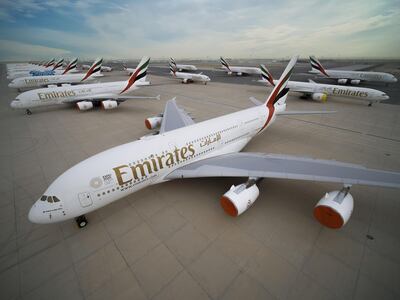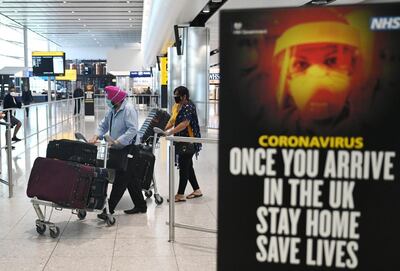Few businesses have taken as hard a hit from the coronavirus pandemic as those in the aviation industry.
Across the world, airlines have called for government bailouts as international travel has all but ground to a halt.
Staff at some airlines were let go or forced to take pay cuts and industry bosses have issued dire warnings about future earnings.
So when restrictions are lifted, what can passengers expect?
Firstly, airlines are expected to space out passengers, meaning many seats will be unused.
That will inevitably to lead to an increase in ticket prices, though perhaps not straight away, experts said.
Periods of quarantine before or after travel may become necessary and staycations or short hops to neighbouring countries are expected to be more common.
Amitabh Upadhya, a professor at Skyline University College in Sharjah who specialises in tourism and travel, said recovery would be slow.
He said the industry survived past crises such as 9/11 and numerous natural disasters, although there was no meaningful comparison to the coronavirus pandemic.
"There will be a slow recovery and people will prefer to travel within their country or region due to a fear of relapse," Prof Upadhya told The National.
“People will want to be able to return home quickly in the event of another lockdown.
“Overall, unless a complete treatment protocol is in place and vaccines are conveniently available, tourism will take a beating.”
The prediction of a slow recovery is in line with those made by global airline bosses.
Ed Bastian, chief executive of Delta Airlines, told staff to expect a “choppy, sluggish recovery” that would take up to three years, even after the virus was contained.
Prof Upadhya said he believed the inevitable downturn in passenger numbers would also affect other businesses that rely on tourism.
“Unfortunately, I don’t see a pleasant scenario fo airlines and hotels and I have even worse fears for the cruise industry,” he said.
“I also have my doubts about the low-cost airlines that saw a surge in the past few decades and have been very successful.
"Larger legacy airline companies with more muscle may gobble up a few or force some to close shop.
“Air travel fares initially will be low and some adventurous travellers would take advantage, but ultimately air travel will become dearer.”
The figures are stark. About two-thirds of the world’s 26,000 passenger aircraft are grounded and about 25 million jobs are at risk in the airline industry, Bloomberg reported.
The International Air Transport Association said airlines faced a $314 billion (Dh1.153 trillion) shortfall in ticket sales this year and half of those companies would be at risk of bankruptcy in two to three months without government help.
More broadly, the World Travel and Tourism Council said 100 million people could lose their jobs.
New working practices may also have an effect on the future of travel.
Restrictions to curb the spread of the virus have meant more businesses across the world have turned to video platforms to hold meetings.
And while many international conferences and seminars have been cancelled due to the pandemic, others have gone ahead online.
Maggie Bootsman, UAE general manager of Travel Counsellors, a company in Manchester that arranges bespoke holidays and operates in seven countries, said that trend could continue.
However, she said she did not believe business travel would suffer long-term.
“It’s true we may see more video conferencing than face-to-face meetings," she said.
"However, people will still need to travel for business to forge and renew relationships with their suppliers and partners.
“The focus will be on traveller health, safety and well-being, and corporate travellers will be looking to their travel suppliers for reassurance that the necessary precautions have been taken to protect people post-Covid-19.”
She said many people were eager to spend travel vouchers given to them by airlines in compensation for cancelled flights.
“We’re supporting our customers to rearrange cancelled travel plans to later in the year or for 2021, with many customers telling us they are craving something positive to look forward to,” she said.
“We’re planning for a renewed love for travel among many of our customers, who will be keen to take to the road or skies again and explore the world as they did before.”
However, those who choose to continue travelling as before could find the experience more cumbersome.
Both Prof Upadhya and Ms Bootsman said they believed enhanced health screening could become a “new normal” for people who booked flights.
Meanwhile, protective equipment has become part of the uniform for cabin crew still at work.
“Post-September 11 saw extra security at airports and tourist destinations and I believe that health checks will become the new normal,” Ms Bootsman said.
“Airline and accommodation providers that have actively protected their customers during this time will be more attractive to travellers, who are going to very aware of any potential risks.”
Justin Francis, chief executive of the UK-based company Responsible Travel, said any drop in tourism numbers could also have devastating consequences for some of the world’s poorest communities, who rely so heavily on the sector.
Mr Francis, whose company offers “authentic and sustainable adventures”, said he was director of a safari company near the Masai Mara National Reserve in Kenya.
“There is now no tourism and the markets are closed. They cannot buy food or easily sell cattle," he said.

Mr Francis said a collaborative approach was critical for the industry to recover.
“The recovery will not be equal,” he said.
“For a time, tourism will narrow down even further on a few trusted favourites who are able to invest quickest in health screening and guarantee good medical care in the destinations.
“Some destinations who can afford it will essentially pay tourists to come.
“If we are to rebuild tourism better than before, then I believe we must act and behave like we are all in this together.”



















